Animation Comes to Life: Anthropomorphism & Wall-E
by Nicola Balkind
My award-winning undergraduate dissertation has been published in the academic journal Film International.
Community Leader
Animation Comes to Life: Anthropomorphism & Wall-E
by Nicola Balkind
My award-winning undergraduate dissertation has been published in the academic journal Film International.
Thursday, 27 May 2010 Written by Nicola Balkind
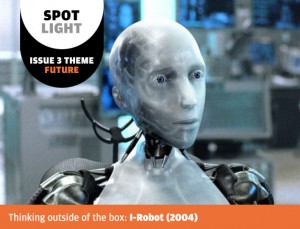
Since the dawn of cinema, filmmakers have been preoccupied with robots and their roles within the human world. From Fritz Lang’s humanoid robot in Metropolis to GERTY, the companion robot in last year’s Moon, our conception of robots is coloured by their human traits. Nicola Balkind looks at seven films that exemplify the anthropomorphosis of robots onscreen.
Metropolis (1927)
Dir. Fritz Lang
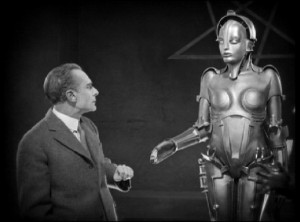
Fritz Lang’s expressionist classic is set in 2026 in the fictional title city of Metropolis, a futuristic urban dystopia in which the upper class or city planners lead lavish lives as the working class live and work underground. Freder, son of the autocratic leader Joh Fredersen, sees the plight of Maria, the subterranean matriarch, and seeks her out in order to ease their plight. Meanwhile, the scientist Rotwang assists Fredersen in quashing the underground revolution by building a robot in Maria’s image to mislead the masses.
The pivotal scene involves the steel-plated robot’s transformation, where it becomes a perfect rendering of Maria’s image. The robot is then ordered to incite the workers to revolt. The highly sexualised robot Maria is an image that is diametrically opposed to the real Maria, who is characterised primarily as a mother. The robot Maria’s half-closed left eye and rigid, quick movements are associated with the fears of technology perceived as threatening and demonic.
Silent Running (1972)
Dir: Douglas Trumbull
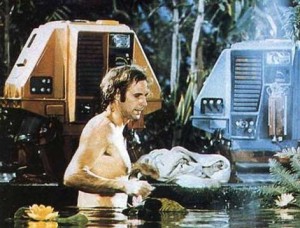
Passionate Freeman Lowell is the sole eco-warrior aboard an aborted space conservation mission. After disposing of his co-workers, Lowell befriends the onboard repair robots, and names them Huey, Dewey, and Louis. He alters their abilities to enable them to performing surgery on his injured leg, play cards and keep him company, and soon their individual personalities emerge.
Though boxy and non-android – they waddle like robotic ducks – their anthropomorphic traits are born through Lowell’s reactions. His nurturing, one-ended discussions transform them from functional machines to companions, bestowing them with human traits of concern, the urge to nurture and to love. He is like a child ascribing emotions to his toys and, by becoming extensions of his personality, these robots truly think and feel.
Star Wars (Episode IV: A New Hope) (1977)
Dir. George Lucas
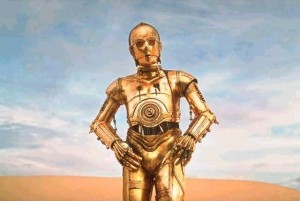
The robots of Star Wars IV: A New Hope are divided into two types: those identifiable by form and those identifiable by function. C-3PO is the Metropolis style anthropomorphic android with full lexical abilities; and R2-D2: the Huey-Dewey-and-Lewey-esque utilitarian astromech. C-3PO is all but human in appearance. When he offfers to donate his own parts to save R2-D2, his altruism further anthropomorphises him – but does he love R2-D2 as a companion, or is he programmed to further the lives of his fellow robots?
Artificial Intelligence: AI (2001)
Dir. Steven Spielberg
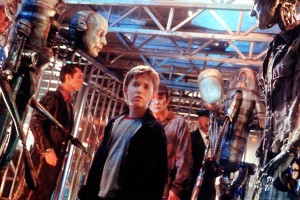
The humanoid robots of Kubrick’s future, played by humans, are extensions of the human form: sleek, intelligent, skilful, and de-anthropomorphised by their lack of physical flaws. A machine (though it seems sacrilegious to call him one) is soon developed that truly replicates the physical characteristics of a child, with one solitary goal: to obtain a mother’s love. David (Hayley Joel Osment) is the first genuinely convincing humanoid robot in this story and in film, the dilemma shared thus: he looks real – orga – to outsiders, but is outcast by those who know he is mechanical. Like C-3PO, David is anthropomorphised in contrast with his robotic counterparts.
Rather than physical, this anthropomorphism is achieved by amplifying his emotions and provoking empathy on a deeply personal level, making them an intrinsic part of David’s character. Unblinking yet overwhelmingly sweet, David is neither fully orga nor mecha. Drifting quietly between two forms of being, he is finally granted his wish to become a real boy. Ultimately, he teaches the advanced robots of human behaviour; carrying over the true essence of humanity into a new era.
I, Robot (2004)
Dir. Alex Proyas
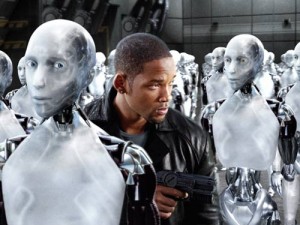
In the year 2035, humans are served by a system of worker robots. The air-tight Three Laws of Robotics prevent these robots from harming the humans whom they serve. Detective Spooner (Will Smith), however, is certain that the death of roboticist Dr. Alfred Lanning – the father of United States Robotics – was caused by these suspicious androids.
I, Robot concerns itself with the growing danger of allowing technology into the home. Compounded by eerie smiles and soft-spoken slave vocabularies, the androids of I, Robot disseminate an innocent yet foreboding presence. Every physical aspect of their humanoid appearance, nimble jointed limbs, and blank stares makes them at once unassuming and intimidating. Controlled by a central nervous system – a female-voiced machine named V.I.K.I – the set-up practically screams developing sentience.
Wall-E (2008)
Dir. Andrew Stanton
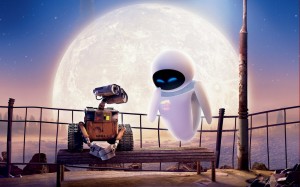
Waste Allocation Load Lifter E-Class, or Wall-E, is the last of his kind left on Earth. The curious cuboid with binocular eyes rescues and collects remnants from the human waste he diligently compacts. Sifting out the cultural gems like a futuristic panhandler, Wall-E learns of, and yearns for, the most revered human traits through the medium of film. The hand-holding protagonists of Hello, Dolly! teach him ‘That is all that love’s about…’ and never to come home until he’s kissed a girl.
Wall-E’s naive demeanour recalls the tandem childlike innocence and persistent genius of silent clowns Charlie Chaplin and Buster Keaton. His charming un-worldliness contrasts sharply with the ‘real’ humans, who gorge themselves into a state beyond recognition. Wall-E’s devotion to another anthropomorphic robot, Eve, and his willingness to return to his lonely world glows with an innocence surpassing even the most ideal vision of humanity.
Moon (2009)
Dir. Duncan Jones
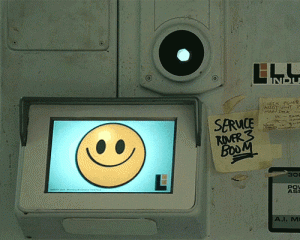
On the far side of the moon, Sam Bell (Sam Rockwell) is the sole mechanic on the LUNAR moonbase. His 3-year contract is close to expiration, and the only real-time contact he receives is from GERTY, the on-board assist robot, voiced by Kevin Spacey. GERTY is anthropomorphised only by the yellow emoticon on his tiny screen. His smooth voice is calm and reassuring, with a paternal and consistently empathetic tone.
In moments of surprise, GERTY’s expressions betray falseness, making his tone seem ominous and deceptive. The robot is not omniscient, however, and can be manipulated by Sam, perhaps unable to read Sam’s true intentions. By revealing the truth behind Sam’s situation, GERTY redeems himself as a trustworthy companion by becoming Sam’s accomplice. The lens above GERTY’s ‘face’ hints at sentience, suggesting a connection that is beyond GERTY’s programmed functions.
Full Interview Transcript:
Firstly, Matt asks, What happened withSuperman?
For every project that comes out of Hollywood, they talk to 100 guys. They have conversations with people: sometimes it works out, sometimes it doesn’t. I’m not actually that interested in doing other people’s characters. The only stuff I’m really interested in is the stuff I was into when I was wee. I’ve been offered some pretty cool films, and I always turn them down, but Superman was the one I always really loved when I was a kid. I tried to get it myself, unsuccessfully, about 4 years ago, then about 2 years ago Matthew Vaughn (director of Kick Ass) and I tried to get it. They were more interested in him than me, and they had a conversation with him about it… At the time nobody was very interested in doing a Superman movie – the last one had lost 200 million – and it was a bit toxic at the time. Then, they just lost interest in us. They talked to some others like the Wachowskis, James McTeigue and a few others. Now, David Goyer and Chris Nolan have got it, which is brilliant. As a fan, I’d love to see a great Superman movie and I think that Dave Goyer is the man. The Batman films have been brilliant, so I hope they can carry that same magic over.
What can you tell us about Wanted 2?
Actually, the news was announced this morning that Angelina Jolie is not doing Wanted 2. It was tricky to have her involved since she died at the end of the first film. You have to think, Wanted was originally a $75 million movie that they expected to make about $150 million, and they made $341 million and good business on DVD. They were trying to find a way to bring her back in the sequel, and there is a route to doing it – they have the healing baths where they could bring back the seriously injured. But, I don’t know, it seemed a bit of a cop-out. Although she wasn’t intended to be the star of the film she became the star because she was so great in it. They will have to get another draft of the script done that doesn’t have Angelina in it. If she isn’t doing it, they will have to move on. Last I heard, there was talk of shooting in early summer with a view to releasing the film towards the end of next year. I haven’t spoken to Universal yet today, so I’m not sure. These things happen.
Will you be a producer on the film?
Well, I have to be, because I part-own it. It’s a kind of J.K. Rowling-Harry Potter relationship, they can’t make the film without me and J.G. Jones, the artist. That is what’s nice. Years ago, you would create a comic book character and you were lucky if you were invited to the premiere. Luckily, that world doesn’t exist anymore and we get all the money, instead of the big companies, which is great.
At the Iron Man panel at Comic Con, they invited the comic book artist on stage.
It’s always nice to see a wee bit of recognition. It’s funny, it went from no recognition to cameos in the films to suddenly owning everything. With things like Kick Ass and Wanted where we own it and the companies don’t, that’s amazing. Comic book creators 20 years ago dreamed of situations like this.
So what has been your role in finding distribution for Kick Ass?
Really, as a producers on the film as well as co-creating it, our role has been to get the movie from the page into the cinemas. It has been a daily process, and there have been hurdles at every stage. The first hurdle we encountered is becoming quite famous now. When we put the screenplay together, we thought that we had something great, and every studio thought it was the worst thing they had ever seen. Not just bad, they thought this was terrible. They said, everything that makes a superhero movie work is missing from this screenplay, and we were like, yes but that’s what is good about it! They were like, no, we hate it, it’s rubbish. I remember one company in particular wrote 3 pages of notes, and everything good about the movie was their complaints. They said, about Hit Girl, “It’s horrible to have a 10 year-old doing this, make her 25 and then it might be palatable. Cut out the bad language, cut out the violence.” Make it a bland studio picture.
I think most people would have been deterred by that, but Vaughn is quite ballsy and he said, well I’ll just go and make it myself, and borrowed $45 million from some of his friends. He’s lucky he knows a lot of rich guys, and could make the movie independently. That was our first hurdle.
At the next stage, we were looking at actors, and that was so hard. To find Hit Girl and Kick Ass himself was a massive challenge, and Vaughn almost put the movie back by 6 months because we looked for 3 months and just couldn’t find a Kick Ass. Then you’ve got costume designs, set builds, etc. So many wee things. Then, eventually, we had a movie we loved with no distributor. Then Vaughn and I had a big job, which was to go and sell it.
What we did was to go to the most hardcore fan base, which is people like us, like Comic Con is the mecca for people like us. So we too the movie there and showed 15 minutes of it in clips, it drove the audience crazy. Luckily! I’ve never seen anything like that, I’ve never seen a hall that frenzied. It was like a rock concert! I can understand people being like that with characters they have an association with, but Kick Ass is a new property and there had only been 6 or 7 issues at that point. People just went nuts, and with every subsequent clip they got a little bit crazier, which was amazing. They were jumping out of their seats and going crazy. Vaughn and I were like, Thank God, you know? Then word via Facebook, Twitter, got back to Hollywood and by the time we took it to L.A., a frenzied bidding war was going on. So, it went from the studios hating it to paying extra for it.
At Comic Con, you swore that you wouldn’t let anyone edit Kick Ass. Has it been changed at all?
Not one word. We’ve got the C word in there, and I remember thinking we would never get away with it. I remember being on set and thinking, this is going to get cut out. It was amazing, Vaughn and I stuck to our guns. There were different people we could have gone with. In the bidding war, there were people who offered us more money and things, but they wanted a final edit on it. We absolutely wanted the final edit, we didn’t want anybody messing with it. We knew what we liked about it, and what they would be scared of. You’ve just got to stick to your guns. If you do something that you like, the money will come. Some people offered to make it a PG-13, and with a wider audience you could make another $100 million, but people could have said that about 300, too, and it wouldn’t have been the same finished product.
Are you ever afraid that you might have hyped it up too much?
No! Not at all, actually. It’s funny because I’ve had this Hitler-like belief in it ever since the beginning, this mad zeal about it all. I remember when the screenplay was written, just reading it and thinking, this is going to be really good. Even since then, all through borrowing money to make it and all of the hurdles along the way, I’ve thought, “This is going to work out great.” We’ve had a great time on it and loved the end result, and if we like it then some other people will like it too. We’ve yet to hear of someone walking out because they didn’t like it. The test screenings were so good that Vaughn didn’t want to tell people because he was worried it would look fake. It was getting 94% Definitely Recommends. We thought, people won’t believe this. Once we started getting more people into screenings we could finally release that information.
You’ve always been overwhelmingly positive about the films you’ve brought out. What would they have to do to your film to make you dislike it?
Just make it rubbish! It will happen. At some point, someone is going to do something of mine that I hate. When you create a property, whether it’s War Heroes or Nemesis or Wanted or whatever and put it out into the wild world, it’s a bit like having a baby and putting it up for adoption. You can try to guide it a little bit, but really it’s in the hands of 300 other people, so all you can do is hope that you’ve put it into the hands of the right people. By a law of averages, one of my things is going to go out to an idiot sometime. Someone who talks the talk, and I walk away feeling brilliant about it, then end up on the set thinking, this is rubbish. That is going to happen at some point. But so far, so good. Timur [Bekmambetov] is an amazing director, did an amazing job on Wanted, and Matthew Vaughn has done an even better job since then, so I’ve been spoiled.
For my new project Nemesis, lots of directors have been coming forward wanting to buy it before it comes out, and I’ve been really selective. Vaughn has been good for advising me on this, saying hold out and get someone brilliant. Again, I don’t look to make a lot of money out of it, I want it to go out to the right people, so I’ve been saying no to everyone at the moment.
Can you tell us a bit about Nemesis?
The comic is out in a few weeks time. Coincidentally, it is out the same week as the UK premiere of Kick Ass. We planned this ages ago and we weren’t sure what the date was going to be. It was a nice coincidence.
The premise is the reversal of a superhero comic, it’s a supervillian comic. What if the world’s smartest, richest man who was a cool billionaire by day put on a costume at night time? He’s a bad guy instead of a good guy. So you’ve got the cops versus this anarchist with all the trappings of a superhero, the car, the planes, gadgets, etc. He travels around the world, taking on the best cops he can find, and spends 4 weeks destroying the city and then executing the best cop at midnight. So he comes to Washington DC to take on America’s best cop.
So far you’ve focused on live action films. Have you thought about making an animation?
I have been less interested in animation. I think my stuff probably doesn’t lend itself to animation as well as live action. I’ve talked about the idea of doing some children’s stuff because my wee girl is 11 and she can’t come to my premieres. I’ve taken her to things like the Harry Potter premiere and the Fantastic Four premiere, which is great, but it seems awful that your dad makes films and you can’t walk down the red carpet and be part of it. By the time I do it and it comes out, she’ll probably be 25, though! I’ve got a couple of ideas about doing a children’s book and things, which might work as animation. For things like Kick Ass where there’s a 10 year-old saying the “C” word, I doubt Pixar will come knocking on my door.
Park Chan-Wook said that he made I’m a Cyborg for his daughter and she didn’t like it. Do you worry that might happen?
That’s the funny thing because, no matter what, your dad is never interesting nor cool. Obviously, they like you, but whatever you do it’s still just your job and it’s what you do before you eat your dinner and watch TV at night. So yeah, it could go that way. Funny you mention him, as one scene in Kick Ass was pretty much lifted from Park Chan-Wook’s Oldboy.
What’s coming up next?
I’ve been bitten by the bug now, of creating stuff. All my life, I wanted to do Spiderman and Superman. It’s so satisfying getting to do that stuff – even if you’re knackered, you think, I’m writing Captain America, this is great! I was talking to Stan Lee and he mentioned that nobody was creating new stuff, everybody was doing the characters he made up. If Stan had done that, and written all of the characters he loved as a kid, you’d never have had the Marvel universe. My idea is to do what Stan did for the modern age, and create a whole new wave of characters. It’s so much fun! To be as lucky as I’ve been where they sell a lot, it has been an incredible stroke of luck. It is a buzz like you can’t believe.
Have you considered getting into filmmaking directly?
I’m directing a film in Scotland this summer. I’m going to use young filmmakers as assistants and use an entirely unknown cast under the age of 25. It’s independently financed. It’s a superhero movie, and not a comedy, it’s going to be a really dark, straight, superhero film, with an epic scale. I don’t want it to be a daft wee British movie, I want it to be cool. So, we’re going to shoot that this summer and take it to Comic Con next year. I’m going to follow that Kick Ass plan because I’ve been quite spoiled this past year, working outside the system. That’s also the way Matthew and I are going to do our next project before Kick Ass 2. I don’t see the point of taking notes from guys who are giving you bad advice. If you can make it outside the system, do it. If Kick Ass is a big hit, Vaughn will be in a George Lucas situation where he doesn’t have to take orders from anyone again. I think that will be inspirational to other guys too. It’s like what happened in comics. The risk is minimal if you’re good.
You’ve said that your comics have an American sensibility, so what insider you to come back to Scotland?
Everything I’ve ever written has been set in New York or Los Angeles or something, because there’s a shorthand with those places. They’re internationally instantly recognisable. If you set something outside of London or England, nobody quite knows what it is. We’ve seen all these movies, and they play around the world. It just works. After seeing District 9, I had a wee notion that it’s interesting to juxtapose a sci-fi thing that’s not associated with sci-fi, like South Africa. I thought, wouldn’t it be good to do the same thing with superheroes? We associate them so much with America that I don’t think there are any major ones set outside of America, so somewhere low-key like Scotland – somewhere that people associate with the past, or whisky, Trainspotting as the most contemporary association – so to do something in Scotland with a superhero template, I thought, would make it quite unique in the same way as District 9 was.
That was my plan. Plus, I’m lazy, I don’t like to travel, so I can just get out of bed and shoot it here, then go back to bed. It will be great!
Kick Ass will premiere with an advanced screening at the Glasgow Magners Comedy Festival on Wednesday 24th March. The UK-wide release date is for the much-anticipated film is Friday, 2nd April.